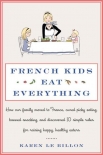French Kids Eat Everything by Karen Billon (interesting books to read for teens txt) 📗

- Author: Karen Billon
Book online «French Kids Eat Everything by Karen Billon (interesting books to read for teens txt) 📗». Author Karen Billon
But the books that family and friends suggested to us were much less innocent in tone. Le Petit Prince was above the girls’ heads. Babar scared them (with the mother elephant being shot in the first few pages), and its colonial story was, in my opinion, racist. Many of the other books that we were offered had incidents that I considered too cruel or macabre for our children. Barbapapa became a favorite, but that wasn’t the sort of reading repertoire I’d hoped for.
Determined to find the French classics that I was sure existed, I went to the village bookstore. The puzzled bookseller wasn’t much help. Having cleverly consulted Philippe beforehand, I knew enough to ask for les grands classiques and les contes de fées (fairy tales). But I was offered Hans Christian Andersen, the Brothers Grimm, and Pippi Long-stocking translated into French. There wasn’t even an equivalent of Mother Goose; French children sing nursery songs instead. Listening to Claire sing “Frère Jacques” in an off-key chorus with her cousins was, I had to admit, very cute. But this didn’t satisfy me as a replacement for reading the sort of books that I identified with childhood.
I tried explaining this to Philippe’s father one evening. “Back home,” I said cautiously, “childhood is viewed as a really innocent time. There are lots of books about magic and make-believe. The French don’t seem to have the same sorts of books.”
“Kids aren’t innocent,” snorted Jo, in an uncharacteristically direct tone. “They’re like little animals. If they aren’t disciplined, they’ll never learn to behave!”
This meant that there were some real differences in how I parented, as compared to the other parents in the village. At the homes we visited in the village, there were far fewer toys than back home (and certainly fewer than in our basement playroom, stuffed from floor to ceiling with kiddie paraphernalia). And French parents didn’t really involve themselves in kids’ playtime as much. I saw this at the local village playground, but also in Paris when visiting my sister-in-law, Véronique. Whereas parents back home would follow their children around, at a discreet distance, helping them clamber and climb if needed, grinning all the while, French parents would more often than not settle onto one of the benches with an uninterested look on their faces. Some even brought magazines or newspapers. Clearly, kids’ play was not for them.
In fact, getting too close to your kids was frowned upon. A common criticism I heard from the other mothers in the village (and one that I was sure was directed at me behind my back) was that someone was “a slave to her children.” Philippe’s relatives were surprised (and, to be honest, a little concerned) about how attached I was to Sophie when she was born—holding her too much, breast-feeding her on demand, and even (the ultimate no-no) sleeping with her.
However, I saw lots of French parents express their love in other ways. They spent a lot of time with their children—in the evenings and on weekends. Families seemed to socialize together a lot more—a dinner invitation would be for everyone, from the youngest to the oldest member of the family. And most of the moms we knew prepared homemade food for their children every day, even if they worked full-time. I marveled at how some of them produced amazing meals in a matter of minutes, dashing around their (by my standards) tiny kitchens. They never seemed to be caught off-guard (as I often was) at dinnertime. Because food was a priority, they were organized, and because they were organized, making good food from scratch was relatively quick and painless. They thought creatively about offering new types of food to their children, exposing them to lots of flavors. Training their children to “taste everything” was one of the most important priorities for the French mothers I met—just as important as reading, talking, or giving the baby toys. This was supported by a loving but authoritative parenting style.
The French approach, I began to realize, is a very good way to behave if you want to prevent food from becoming a power struggle between parents and kids. At first glance, their methods seem coercive because there are so many rules and limited choices. But in fact the opposite is true. Because there are fixed rules and routines that everyone (including the parents) respects, there is no negotiation and no power struggles. French kids, in general, thrive within this structured approach to parenting. And French parents also make sure that food is fun and tasty, which helps kids look forward to eating. As a result, their kids are usually happy to come to the table.
In our house, on the other hand, we had few routines and fewer rules. I wasn’t sure why I behaved this way, never having articulated my parenting style to myself. The fragments of ideas I remembered from the books on “attachment parenting” were the closest I got to a parenting philosophy. Children need to form an emotional bond with their parents. Anything that threatens the parent-child relationship is a threat to their long-term psychological health. Now, I began scrutinizing these ideas. In practice, I began to realize, my attachment to these ideas had translated into my not wanting to argue about food (or lots of other things) with my kids, because I didn’t want to screw them up, or weaken our attachment. Admittedly, once written down, this does not seem entirely logical. But in the sleep-deprived state that lasted for years once the





Comments (0)